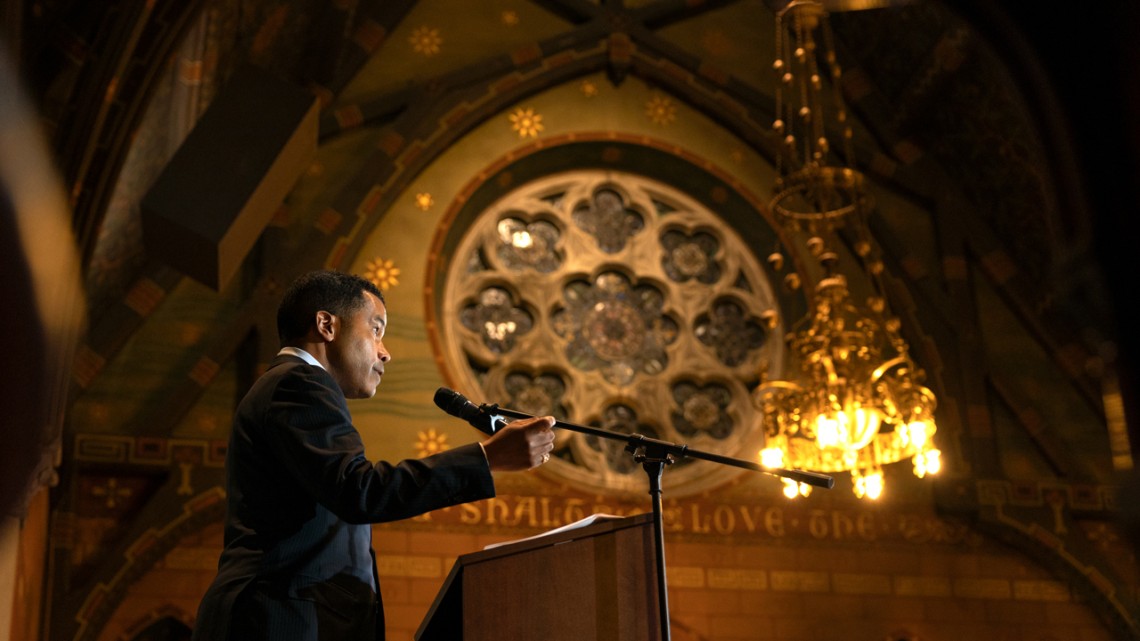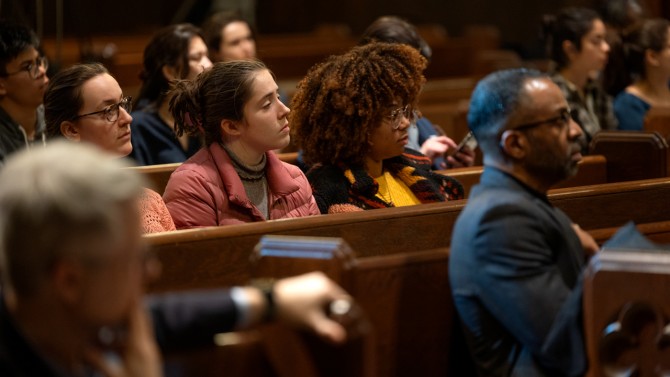
Richard T. Ford, the George E. Osborne Professor of Law at Stanford University, delivers the annual Martin Luther King Jr. Commemorative Lecture Feb. 13 at Sage Chapel.
MLK lecture examines racial justice after affirmative action
By Stephen D’Angelo
As the Supreme Court considers two landmark cases that could end race-conscious admission practices, “diversity” has become an easy substitute for difficult conversations about the racial injustices that make affirmative action necessary, according to an antidiscrimination law expert who delivered the annual Martin Luther King Jr. Commemorative Lecture, held in Sage Chapel Feb. 13.
“Affirmative action may be in its final hours, but ‘diversity’ has come to define the national, and increasingly even the global, discussion of racial justice,” said Richard T. Ford, the George E. Osborne Professor of Law at Stanford University, whose lecture, “Derailed by Diversity: Racial Justice after Affirmative Action,” explored the future of racial justice and admissions in higher education, at a time when current race-conscious admissions practices are under fire.
While the concept of diversity has stimulated modest efforts to promote racial integration and racial inclusion, Ford said, the term has replaced discussions on the generations of race-based exclusion and exploitation.
“In this way diversity has encouraged us to ignore and minimize past injustices, and therefore has distorted and limited what our notions of justice require today,” Ford said.
With the U.S. Supreme Court set to rule on two landmark cases that could end current race-conscious admissions practices, Ford’s lecture examined how legal notions of diversity have limited affirmative action and suggested new ways universities can advance racial justice and cultivate diverse and inclusive communities after affirmative action.
If the court decides to curtail race-based admissions, Ford suggested institutions return to a focus on remedying institutionalized discrimination by looking carefully at the practices that continue to screen out members of underrepresented groups.
For example, Ford said, conventional selection criteria for admissions, such as high school grades and standardized test scores, have a strong racial impact.
“These are not the equivalent of merit, and we need to remember that. They are proxies for merit. And they’re imperfect proxies for it,” he said. “Selective universities would need to work to find better proxies that don’t screen out a disproportionate number of people of color.”
Other options could include awareness of the high schools from which most selective universities draw a disproportionate number of students, and a heightened focus on outreach to minority communities to counteract any perception that the ruling closed the doors to higher education.
In the early 1970s, Ford said, conversations about racial justice included terms such as “civil rights,” “integration” and even “Black power.” Today, people, companies, and institutions focus on “diversity,” which is not the same as racial justice.
The 1978 ruling in the Regents of the University of California v. Bakke that sustained affirmative action transformed how colleges think about race and equality in admissions, Ford said. In essence, he said, the ruling made affirmative action unlawful if a university adopted it to correct or account for the racial injustices of society – limiting how institutions of higher education could talk about their individual commitments to racial inclusion.
Diversity became the substitute, Ford said.
“Diversity has required universities to finesse, if not to eschew, the salience of racial injustice,” he said. “Diversity places all the focus on something pleasant: multicultural enrichment rather than on racism. [It] is a topic for corporate retreats and alumni fundraisers where etiquette would demand that one avoid controversial or upsetting subjects.”
The good news, Ford said, is that there’s greater societal understanding and awareness of the problems of racial injustice than there was during Supreme Court cases about affirmative action over the past 50 years. He suggested that those who actively support higher education should make it clear they will not tolerate a backslide on racial inclusion at universities and colleges in the face of an adverse Supreme Court opinion.
“We should not expect the United States Supreme Court to offer justice,” he said. “We must refuse to accept the substitute justice that they’re likely to offer. We must demand the real thing.”
The lecture can be streamed on eCornell until Feb. 20, for those who register here.
This year’s Martin Luther King, Jr. Commemoration, which included the lecture, a community lunch with the Greater Ithaca Activity Center and a fireside chat at the Cornell Law School, was sponsored by the Office of Spirituality and Meaning-Making and Cornell United Religious Work, the Office of Academic Diversity Initiatives, Cornell Law School and Greater Ithaca Activities Center, with additional support from the Cornell Ann S. Bowers College of Computing and Information Science, the College of Architecture, Art and Planning, the David M. Einhorn Center for Community Engagement and the SC Johnson College of Business.
Stephen D’Angelo is the assistant director of communications and marketing for Student and Campus Life.
Media Contact
Get Cornell news delivered right to your inbox.
Subscribe

